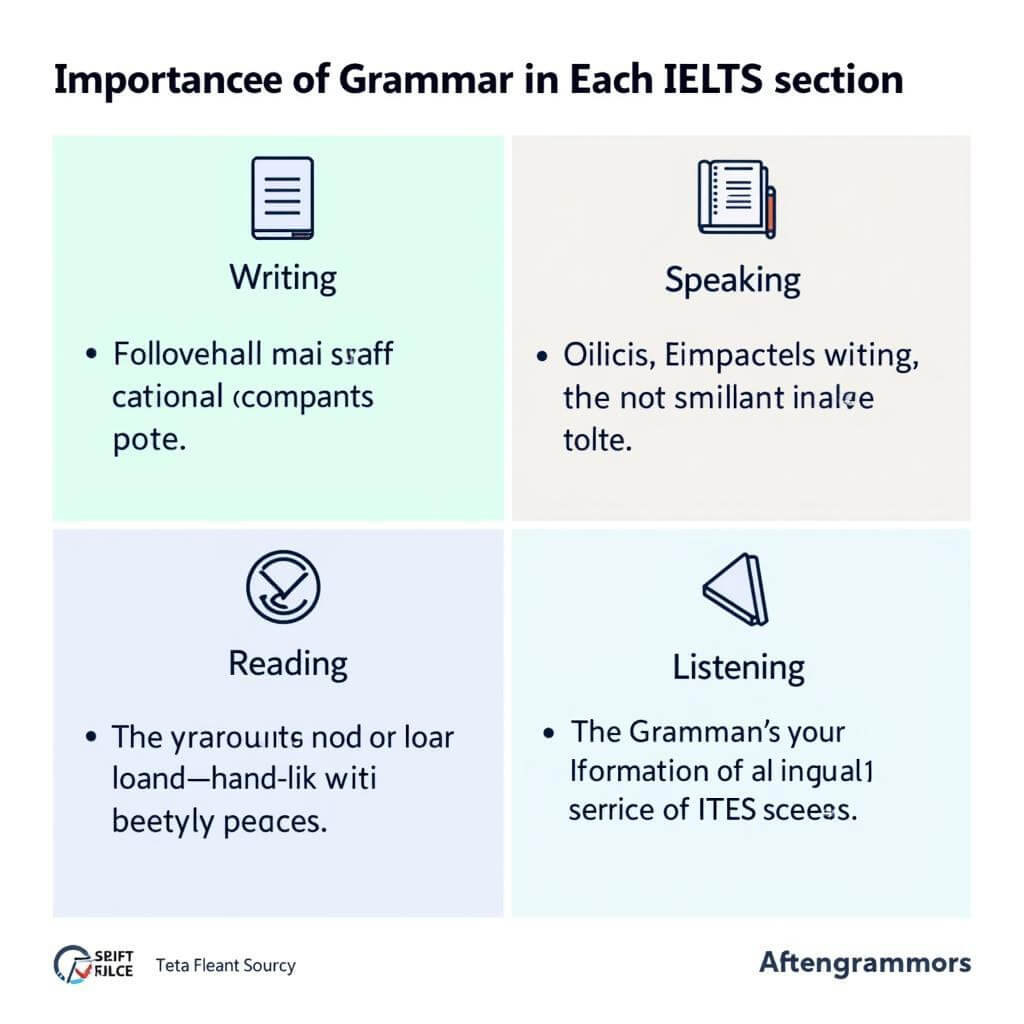Grammar proficiency is a cornerstone of success in the IELTS exam, significantly impacting your overall performance across all sections. This comprehensive guide will equip you with essential strategies and techniques for mastering grammar, helping you achieve those coveted high band scores.
Understanding the Importance of Grammar in IELTS
Grammar serves as the foundation for clear, effective communication in both written and spoken English. In the context of IELTS, examiners meticulously assess your grammatical range and accuracy, which directly influence your band scores.
The Role of Grammar in Each IELTS Section
- Writing: Precise grammar is crucial for coherent essays and reports.
- Speaking: Correct sentence structures enhance fluency and coherence.
- Reading: Strong grammar skills aid in comprehending complex texts.
- Listening: Understanding grammatical nuances improves overall comprehension.

Key Grammar Areas to Focus On
To excel in IELTS, concentrate on these critical grammar aspects:
- Verb Tenses
- Sentence Structures
- Conditional Sentences
- Passive Voice
- Relative Clauses
- Articles and Determiners
- Prepositions
- Subject-Verb Agreement
Dr. Emily Thompson, a renowned IELTS expert, emphasizes, “Mastering these core grammar elements can significantly boost your confidence and performance across all IELTS tasks.”
Strategies for Improving Grammar Skills
1. Regular Practice with Authentic Materials
Immerse yourself in genuine English content such as newspapers, academic journals, and podcasts. This exposure helps internalize correct grammar usage naturally.
2. Utilize Grammar Workbooks and Online Resources
Invest time in grammar-focused exercises and quizzes. Websites like British Council and BBC Learning English offer excellent, IELTS-specific grammar resources.
3. Keep a Grammar Journal
Record new grammatical structures you encounter and practice using them in your own sentences. This active learning approach enhances retention and application.
4. Peer Review and Group Study
Engage in grammar discussions with study partners. Explaining concepts to others and receiving feedback can deepen your understanding and highlight areas for improvement.
5. Focus on Error Correction
Regularly review your writing and speaking samples, identifying and correcting grammatical errors. This self-awareness is crucial for progress.
Using correct grammar in speaking is equally important as in writing. Practice speaking with correct structures to enhance your overall performance.
Advanced Techniques for Grammar Mastery
1. Analyze Model Answers
Study high-scoring IELTS responses, paying close attention to the grammatical structures used. Try to incorporate these into your own practice.
2. Use Grammar in Context
Instead of isolated exercises, practice grammar within full IELTS tasks. This approach better prepares you for the exam environment.
3. Develop a Sense of Language ‘Feel’
Native speakers often rely on what ‘sounds right’. Develop this intuition through extensive reading and listening to native English content.
4. Master Coherence and Cohesion
Learn to use signposting language effectively to enhance the flow and structure of your responses.
Common Grammar Pitfalls in IELTS
Awareness of frequent errors can help you avoid them:
- Inconsistent verb tenses
- Run-on sentences or sentence fragments
- Misuse of articles (a, an, the)
- Incorrect preposition usage
- Subject-verb agreement errors
Professor Mark Anderson, an IELTS examiner with 15 years of experience, notes, “Candidates who consistently avoid these common mistakes often score half to one band higher in their grammar assessment.”
Avoiding grammar mistakes in timed tasks is crucial for maintaining accuracy under pressure during the exam.
Integrating Grammar Practice into IELTS Preparation
1. Timed Writing Exercises
Regularly complete timed writing tasks, focusing on grammatical accuracy alongside content and organization.
2. Speaking Drills
Practice speaking on various topics, recording yourself to review for grammatical errors later.
3. Grammar-Focused Reading
While completing IELTS reading practice, pay extra attention to complex grammatical structures in the passages.
Practicing grammar with writing prompts can be an effective way to improve both your writing skills and grammatical accuracy simultaneously.
Maintaining Grammar Skills During the Exam
- Allocate time for proofreading in writing tasks
- Mentally review your spoken responses for grammatical accuracy
- Stay calm and focused to minimize stress-induced errors
Remember, consistent practice and application of strategies for better grammar usage are key to achieving high band scores in IELTS.
Conclusion
Mastering grammar for high band scores in IELTS requires dedication, consistent practice, and strategic learning. By focusing on key grammar areas, employing effective study techniques, and integrating grammar practice into your overall IELTS preparation, you can significantly enhance your performance across all sections of the exam. Remember, the journey to grammatical proficiency is ongoing, but the rewards in terms of improved communication skills and higher IELTS scores are well worth the effort.
FAQs
-
How much does grammar affect my IELTS score?
Grammar is a crucial component, directly impacting your scores in Writing and Speaking, and indirectly influencing Reading and Listening performance. -
Can I improve my grammar in a short time before the IELTS exam?
While significant improvement takes time, focused practice on key areas can yield noticeable results even in a short period. -
Should I use complex grammar structures to impress the examiner?
Use a mix of simple and complex structures accurately rather than forcing complex grammar at the expense of clarity. -
How can I practice grammar for the Speaking section?
Record yourself speaking on various topics, then review for grammatical accuracy. Practice with a study partner for immediate feedback. -
Are there any grammar rules specific to IELTS?
While IELTS doesn’t have specific grammar rules, it emphasizes clear communication and the ability to use a range of structures accurately. -
How often should I practice grammar for IELTS?
Incorporate grammar practice daily, even if just for 15-30 minutes, focusing on areas where you need improvement. -
Is British or American English grammar preferred in IELTS?
IELTS accepts both British and American English, but consistency in your chosen style is important throughout the test.